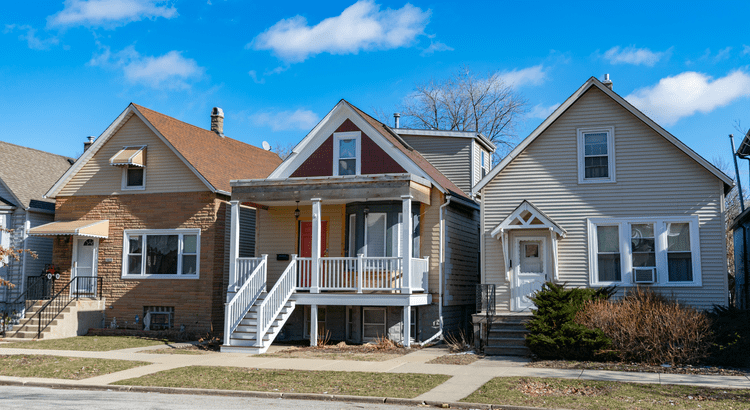There are pros and cons to being a first-time homebuyer. On the one hand, you’re starting to build equity, and your credit score is increasing. That’s a good thing!
On the other hand, you may not have the cash to put down a 20% conventional downpayment, so you might have to take out a first-time homebuyer loan. These loans often come with less favorable terms than conventional mortgages. Another downside is that if the market takes a downturn when you’re young and buying your first home, you may be stuck with high monthly payments that are difficult to afford.
Make sure you do your research before taking the plunge into homeownership!
Let’s expand on the pros and cons we listed above so we can paint you a complete picture of what you should be considered as a potential first-time homebuyer. It’s a big decision, and we want to make sure we help you seriously think about the important factors before you dive into the realm of real estate ownership. It’s a fun, exciting, and rewarding world, but it also seriously impacts your life journey.
The Pros of Being a First-Time Homebuyer
Let’s talk about the great things that come along with investing in real estate. Buying a home can be life-changing, and we want to highlight some of the things you’ll hopefully benefit from by buying your first home!
You’re Building Equity
This is one of the best things about buying your own home. You’re no longer paying someone else’s mortgage each month – you’re investing in your future by building equity in your property. If you eventually sell, you’ll ideally be able to pocket a nice chunk of cash because your home will have gone up in value. Remember that the real estate market can be volatile, so there’s no guarantee your home will always go up in value. But over the long term, prices have trended upward, so real estate is generally a solid investment.
Several down payment assistance programs and programs help reduce closing costs for first-time homebuyers to encourage this concept of getting a home loan and buying a house to build equity. Real estate agents and your mortgage broker will know about these programs for first-time buyers, so be sure to ask about them before applying for a home loan.
Eventually, you’ll be able to afford a conventional loan, which will increase your equity right from the start since you’ll have more money invested right away. If you want to use a conventional loan someday, saving money is a good idea.
You’re Boosting Your Credit Score
When you make regular monthly payments on time, your and your partner’s credit scores will increase. A higher credit score can open many doors for you – it’ll make it easier to get approved for a future home loan, get lower interest rates, and even qualify for rent-to-own programs. If you have a minimum credit score currently, you might have noticed that people don’t really want to loan you money or give you their best credit card offers. So if you’re looking to buy a home, save money, and boost your credit score simultaneously, this is a great way to do it.
You Have Your Own Space
This one is pretty self-explanatory – you no longer have to share common areas with anyone else or worry about noisy neighbors above or below you! This tends to be the spark that lights the flame for first-time buyers to start looking for homes. You can finally stretch out and enjoy your own personal space. This is especially great if you have kids or pets because they’ll have their own space and yard to play in.
The Cons of Being a First-Time Homebuyer
We aren’t highlighting these downsides to discourage you. We are highlighting these to educate you so you can feel more confident and have fewer worries as you go through the home-buying process. The more you know, the better you’ll be at making the correct decisions. Information is power, so use it!
You May Not Have the Cash for a Conventional Downpayment
If you don’t have at least 20% to put down on your home, you’ll likely have to take out a first-time homebuyer loan. These loans often come with less favorable terms than conventional mortgages, so ensure you understand all the details before signing on the dotted line. You’ll also have to pay private mortgage insurance (PMI) if your downpayment is less than 20%, which will add to your monthly expenses.
Reminder: There are down payment assistance programs and programs that help reduce closing costs for first-time buyers, so ask your real estate agents and mortgage lenders about these! These programs can make your monthly payment more manageable and make buying a house feel attainable.
You’re More Vulnerable to Market Fluctuations
When you’re young and buying your first home, you’re more likely to be impacted by market fluctuations than older buyers. For example, if the market takes a downturn and home prices fall, you may be stuck with a mortgage worth more than your home, a monthly payment that feels impossible to meet, and property taxes and utility bills to boot. This is called being “underwater” on your mortgage, and it can be difficult to find a way out. On the other hand, if prices are rising rapidly, you may pay more than you need for your home. So it’s essential to be aware of these risks before buying a property.
You Might Not Get Approved for As Much as You Want
If you’re buying a home for the first time, you might not get approved for as high of a loan amount as you’d like. Lenders will often consider your debt-to-income ratio and credit score when determining how much they’re willing to lend you. So if you’re not bringing in a high income, you have the minimum credit score available, or you have a lot of student loan debt, you may not be able to get approved for as much as you need. This can limit your options for finding a home that fits your budget.
You Could Get Outbid by Older Buyers
If you’re buying a home in an area where prices are high, or if you’re buying a home amidst high inflation, you might be up against stiff competition from older, more established buyers. They often have more money to offer and may be able to put down a larger downpayment, so they’re more likely to win in a bidding war. This can make it difficult for first-time buyers to find a home that meets their needs and budget.
One trick we recommend is writing a personal letter every time you submit an offer if your competition is fierce. Tug at the seller’s heartstrings. Not everything is about money, but money is tied to emotion. This is an excellent strategy for sellers to think back to when they bought their first home. They might like the idea of you raising your little family in their beloved home. Never underestimate the power of genuine interest and a hand-written sentiment.
Bottom Line
There are both pros and cons to being a first-time homebuyer. You’ll need to weigh your options and make the decision that’s right for you. If you’re unsure whether buying a home is the right move for you, it might be worth talking to a financial advisor or realtor to get some guidance. They can help you understand your unique situation, make sense of the home-buying process, and make an informed decision about whether or not buying a home is right for you.
Also, if you haven’t already, you should start reading real estate news to get a feel for your local market. You can find many free articles online that provide accurate and helpful insights into your local real estate market. One such resource we’d like to recommend is TheMLSonline. They have daily news about the Minnesota real estate market and lots of info specifically geared toward first-time homebuyers. Go check them out!








